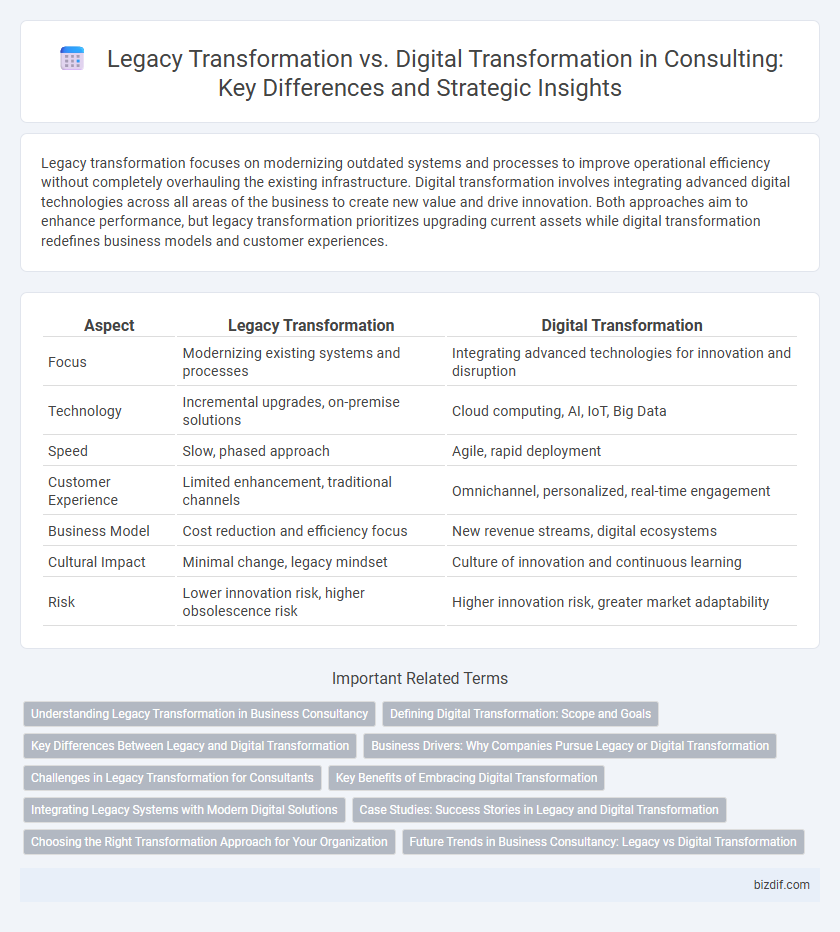Legacy transformation focuses on modernizing outdated systems and processes to improve operational efficiency without completely overhauling the existing infrastructure. Digital transformation involves integrating advanced digital technologies across all areas of the business to create new value and drive innovation. Both approaches aim to enhance performance, but legacy transformation prioritizes upgrading current assets while digital transformation redefines business models and customer experiences.
Table of Comparison
| Aspect | Legacy Transformation | Digital Transformation |
|---|---|---|
| Focus | Modernizing existing systems and processes | Integrating advanced technologies for innovation and disruption |
| Technology | Incremental upgrades, on-premise solutions | Cloud computing, AI, IoT, Big Data |
| Speed | Slow, phased approach | Agile, rapid deployment |
| Customer Experience | Limited enhancement, traditional channels | Omnichannel, personalized, real-time engagement |
| Business Model | Cost reduction and efficiency focus | New revenue streams, digital ecosystems |
| Cultural Impact | Minimal change, legacy mindset | Culture of innovation and continuous learning |
| Risk | Lower innovation risk, higher obsolescence risk | Higher innovation risk, greater market adaptability |
Understanding Legacy Transformation in Business Consultancy
Legacy transformation in business consultancy involves modernizing outdated systems, processes, and technologies while preserving core business functions and data integrity. This approach ensures minimal disruption by gradually replacing legacy infrastructure with scalable solutions tailored to current market demands. Expertise in assessing legacy system dependencies and aligning transformation strategies with organizational goals is crucial for successful implementation.
Defining Digital Transformation: Scope and Goals
Digital transformation involves leveraging advanced technologies such as cloud computing, AI, and IoT to fundamentally change business operations, customer experiences, and value delivery. The scope includes integrating digital tools across all departments to improve agility, innovate products, and enhance data-driven decision-making. Key goals focus on increasing operational efficiency, driving customer engagement, and enabling scalable growth through continuous digital innovation.
Key Differences Between Legacy and Digital Transformation
Legacy transformation primarily involves updating or replacing outdated systems and processes to improve efficiency without fundamentally changing business models. Digital transformation focuses on leveraging advanced technologies like AI, cloud computing, and big data to create new value propositions and drive innovation. Key differences include the scope of change, with legacy transformation being incremental and digital transformation being strategic and disruptive.
Business Drivers: Why Companies Pursue Legacy or Digital Transformation
Companies pursue legacy transformation to address outdated systems that hinder operational efficiency, aiming to reduce maintenance costs and improve system reliability. Digital transformation is driven by the need to enhance customer experiences, leverage advanced analytics, and accelerate innovation through cloud computing, AI, and automation. Business drivers for both transformations include competitive pressure, regulatory compliance, and the imperative to scale agilely in fast-evolving markets.
Challenges in Legacy Transformation for Consultants
Legacy transformation poses significant challenges for consultants due to the complexity of integrating outdated systems with modern technologies while ensuring data integrity and minimizing operational disruptions. Consultants must navigate difficulties such as limited documentation, resistance to change from stakeholders, and high costs associated with migrating legacy infrastructure. Managing compliance risks and aligning legacy system upgrades with evolving business goals further complicates the transformation process.
Key Benefits of Embracing Digital Transformation
Embracing digital transformation enables organizations to leverage advanced technologies such as AI, cloud computing, and data analytics, driving significant improvements in operational efficiency and customer experience. Unlike legacy transformation, which often focuses on updating existing systems, digital transformation fosters innovation, agility, and scalable growth by reimagining business models and processes. This strategic shift results in enhanced competitive advantage, faster time-to-market, and more data-driven decision-making capabilities.
Integrating Legacy Systems with Modern Digital Solutions
Integrating legacy systems with modern digital solutions requires a strategic approach to legacy transformation that preserves critical data and processes while enabling digital transformation benefits. Legacy transformation focuses on upgrading, migrating, or reengineering outdated infrastructure to support agility, scalability, and real-time data integration essential for digital platforms. Consultants prioritize seamless interoperability and minimal disruption by leveraging APIs, middleware, and cloud services to connect legacy applications with innovative technologies such as AI, IoT, and cloud computing.
Case Studies: Success Stories in Legacy and Digital Transformation
Case studies in legacy transformation demonstrate how organizations successfully modernize outdated systems, enhancing operational efficiency and reducing maintenance costs. Digital transformation success stories highlight the integration of advanced technologies like AI, cloud computing, and IoT, driving innovation and customer engagement. These documented examples provide valuable insights into strategic approaches, challenges overcome, and measurable business outcomes in both legacy and digital transformation projects.
Choosing the Right Transformation Approach for Your Organization
Selecting the appropriate transformation approach hinges on understanding your organization's existing systems and strategic goals; legacy transformation focuses on modernizing outdated infrastructures, while digital transformation emphasizes adopting new digital technologies to innovate business models. Evaluating factors such as cost, risk tolerance, and anticipated ROI helps determine whether to optimize legacy assets or pursue disruptive digital initiatives. Aligning transformation strategies with organizational culture and market demands ensures sustainable growth and competitive advantage.
Future Trends in Business Consultancy: Legacy vs Digital Transformation
Future trends in business consultancy highlight a strategic shift from legacy transformation, which centers on upgrading existing systems, to digital transformation characterized by adopting cloud computing, artificial intelligence, and agile methodologies. Consultants increasingly prioritize digital ecosystems that enable scalability, real-time analytics, and customer-centric innovations over traditional IT infrastructure overhauls. Embracing these digital transformation trends empowers businesses to enhance operational efficiency, accelerate decision-making, and maintain competitive advantage in rapidly evolving markets.
Legacy transformation vs Digital transformation Infographic

 bizdif.com
bizdif.com